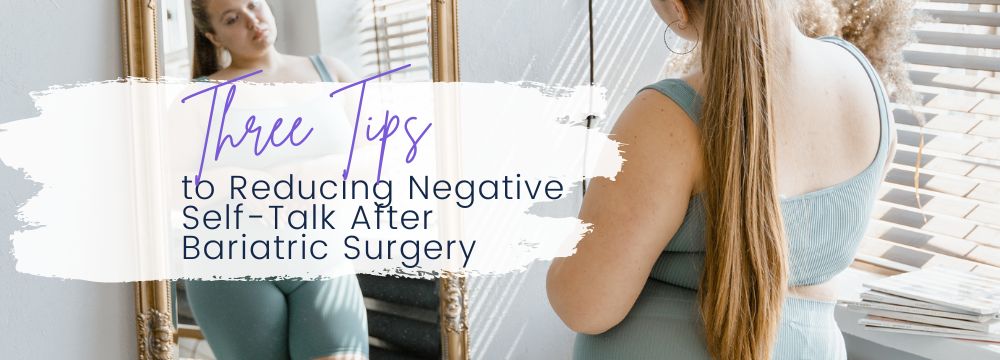
It’s easy to think that the weight loss process after bariatric surgery is as simple as “calories in and out,” but that’s not always the case. To be sure, the number of calories you consume is directly related to the amount of weight loss you can achieve. If you are not in a calorie deficit, it stands to reason that you won’t lose weight. Of course, exercise also plays a vital role in increasing muscle mass to aid in reaching a calorie deficit. But you may have found, through previous highly restrictive diets, that you gain the weight back quickly once you “stop.” No matter how restrictive your diet is, you can hit a wall, making it even more tempting to cut calories to see the number on the scale go down again.
The body is a finely tuned machine; it is not simply about kale and cardio to reach long-term and sustainable weight loss. Several other factors, including how your body processes those calories and whether it’s doable over the long term, determine whether your “diet” is sustainable and effective.
Sleep As a Diet Tool
Sleep has been shown in multiple studies to be one of the most significant determinants of weight loss and the ability to maintain a normal BMI. People who sleep between seven and nine hours experience many physical benefits. Further, sleep has psychological advantages too.
For one, if you’ve had a good night’s sleep, you’re more likely to feel refreshed and ready for the day. This simple psychological pick-me-up allows you to make better food choices, not seek out the high-fat, high-sugar foods within reach, and can give you the motivation to get to the gym or go outside and exercise.
Sleep can also affect how your body produces and regulates critical hormones related to satiety and hunger – cortisol and ghrelin. Poor sleep can lead to increased cortisol production in your body. Cortisol is the hormone that regulates the fight or flight response and the overall stress levels in your body. Some cortisol is essential to give you focus but constantly elevated stress, like most of us experience in modern life, can lead to overproduction. This makes it harder to eliminate fat and, in many cases, increases fat storage in the body. Secondly, poor sleep can increase ghrelin, the hunger hormone, in the body, while it reduces leptin, the hormone that induces satiety.
How Can You Get Better Sleep?
There are several ways anyone, bariatric surgery patient or not, can improve their sleep. Some of the most common tips and tricks include:
- Not consuming caffeinated foods or drinks past the early afternoon.
- Keeping your sleep area for rest means making the bedroom a no TV or device zone.
- Getting off devices about two hours before bedtime.
- Not eating a heavy meal in the evening or anything too late in the day.
- Exercising earlier in the day, but well before sleep time.
- Taking a warm shower before bed.
- Enjoy intimacy before bedtime.
- Keeping your room cool and dark.
- Establishing a bedtime routine. Bath, book, and lullaby work for a reason! Adults can also benefit from a wind-down ritual that signals it’s time to slow down.
Of course, sleep considerations depend on the individual, and we know that lots of advice are readily available on the Internet and social media. This barrage of information aside, additional factors should be considered for bariatric patients, for whom sleep can be even more difficult. Let’s talk about the reasons why:
I Have Sleep Apnea
You may experience sleep apnea even after bariatric surgery, especially early on. You may have lived with this condition for months or years and never addressed it. If you have much weight to lose, you may wish to speak to a sleep specialist to understand your condition and what is available to you. An assistive device called a CPAP machine might help you sleep better in the short term. Even a few months with better sleep can be transformative. But be very careful when taking over-the-counter or prescription sleep medication, as these can be disruptive or addictive.
My Joints Hurt
It’s not discussed much, but your joints may begin to hurt as you lose weight. This isn’t unusual and does not mean something is wrong with your procedure or body. Instead, you must remember that, as your body composition changes, the muscles and joints that were never activated might start to bear weight and require strengthening. Early on, you may be advised to take over-the-counter painkillers or anti-inflammatories to manage this pain, but it’s even better if you make a point of strengthening the areas of your body that can have the most beneficial effect on your joint pain. This includes strengthening your core and your glutes. As tempting as it may be to focus on the more visible parts of your body, like your arms, the middle of your body provides you with the most support. Remember not to overdo it, as it is early on in a new exercise regimen that you have the highest risk of injury.
The Wrong Equipment
No doubt, these issues can make sleeping that much more difficult. In addition, your changing body composition may make what was once a perfect sleeping position no longer comfortable. This is a great time to evaluate your bed and pillows. Is your mattress more than five or seven years old? Is it sagging? Do your pillows retain their shape and keep your body correctly aligned throughout the night? These are all questions you need to ask as you consider investing in proper sleep “equipment” to make sure you are maximizing your time in bed.
Emotions
Excitement, disappointment, and all the feels in between are an expected part of the post-op bariatric surgery process. Each emotion and how you process them can affect the quality and regularity of your sleep. Are you not losing enough weight? Are you losing too much? Why isn’t the scale dropping? My relationships are changing. I don’t feel hungry… I always feel hungry.
These are the challenges that early-stage bariatric surgery patients face every day. This worry can contribute to poor sleep and perpetuate a vicious cycle of worry, leading to weight gain and back to worry. Whether bariatric surgery or not, the mental health component of weight loss is significant. We must take great care of our psychological health to ensure we maximize our physical health.
This is easier said than done, especially when so much is changing around us. Many of these changes are very exciting, while others can seem daunting. If you have a strong support network of family and friends around you through these ups and downs, you will undoubtedly be more successful than trying to go at it alone. That said, there is also no shame in working with a mental health professional to help you navigate these challenges. Remember, you are not alone, nor should you avoid help, thinking it’s the easy way out. Just the opposite — asking for help is one of the best things you can do for your health.
Ultimately, remember that you are the master of your destiny after bariatric surgery. Yes, physical, psychological, and hormonal changes occur after surgery, but most factors are in your control. By recognizing your old habits and giving yourself the grace and time to learn and improve the new ones, you will soon establish a path to wellness beyond what you thought was possible. As you progress through your bariatric journey, your sleep will likely improve. But why not use the tips above to hasten that process to start feeling better sooner?









